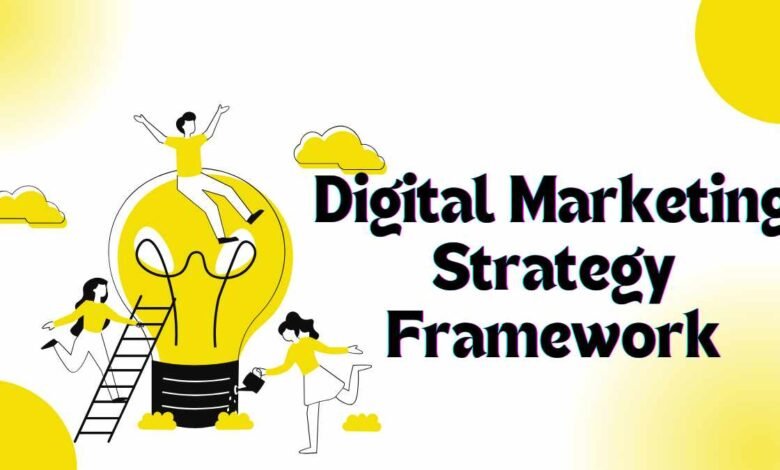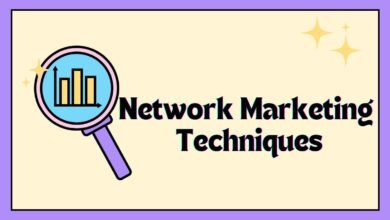Digital Marketing Strategy Framework: Ultimate Comprehensive

Digital marketing strategy framework, a solid digital marketing strategy is crucial for businesses to thrive. Whether you’re a startup or an established company. Having a well-thought-out digital marketing framework ensures that your marketing efforts are both effective and efficient. This strategy isn’t just about throwing content on the internet. It’s a comprehensive plan that integrates various tactics, tools, and methods. Let’s dive into the key components of a successful digital marketing strategy and how it can help your brand.
Understanding the Online Marketing Plan
An online marketing plan serves as the blueprint of your entire digital marketing strategy. It’s like a roadmap that guides every digital marketing activity, ensuring that your actions are aligned with your business objectives. Developing an online marketing plan involves analyzing your target audience, setting clear marketing goals. And choosing the best platforms to reach your audience. It’s all about making informed decisions. The online marketing plan is dynamic, meaning it evolves based on trends and consumer behaviors. In essence, it should be adaptable to new data, allowing businesses to adjust their strategies as needed. This flexibility makes sure that your brand stays relevant in a rapidly changing digital landscape.
Building a Robust Content Marketing Strategy
Content marketing is the backbone of any digital marketing framework. Whether it’s blog posts, videos, podcasts, or infographics. Content marketing is about delivering value to your audience, not just pushing products or services. One of the essential elements in building a content marketing strategy is understanding your audience’s needs. By creating content that addresses these needs, you establish authority in your industry and build trust with your audience.
Must Visit: Flex Flows
The Role of Social Media Marketing Framework
A well-developed social media marketing framework can help businesses connect with their audience, create brand awareness, and foster customer loyalty. But social media marketing isn’t just about posting updates; it requires a strategic approach. Developing a social media marketing framework involves choosing the right platforms (such as Facebook, Instagram, LinkedIn, or Twitter) and crafting content that resonates with each platform’s audience. Each platform has its unique user base, and the content must be tailored to fit these different demographics
SEO Strategy Development

It involves a combination of on-page SEO, off-page SEO, technical SEO, and local SEO. On-page SEO focuses on optimizing the content on your website, ensuring that it includes relevant keywords, proper meta tags, and high-quality images. Off-page SEO involves building backlinks to your site from other reputable websites, which signals to search engines that your site is trustworthy. Technical SEO ensures that your website is free of errors, loads quickly, and is mobile-friendly. Local SEO, on the other hand, optimizes your website to rank higher in local searches, especially useful for businesses targeting a specific geographic area.
Understanding Digital Advertising Tactics
Digital advertising is another critical component of a successful digital marketing framework. Unlike organic strategies like SEO or content marketing, digital advertising involves paying for placement on platforms like Google, Facebook, or Instagram. There are several types of digital advertising tactics, including search engine marketing (SEM), display ads, social media ads, and video ads. Search engine marketing allows businesses to show their ads at the top of search results, while display ads appear on websites that are part of a network. Social media ads are designed to engage users on platforms like Facebook or Instagram, while video ads (often used on YouTube) are a great way to capture attention.
Integrating All Aspects into a Unified Strategy
A successful digital marketing strategy framework isn’t just a set of disconnected tactics. It’s about integrating each of these elements—content marketing, social media, SEO, and digital advertising—into a cohesive plan. Each part should complement the others, ensuring that your brand’s messaging is consistent across all platforms. For instance, content created for your blog can be repurposed for social media posts, email marketing campaigns, or even ads. Meanwhile, SEO ensures that this content reaches a broader audience, while digital advertising can give an additional boost to the most valuable pieces of content.
The Success of Digital Marketing Efforts
With the right tools, you can track the performance of each marketing campaign, analyzing which strategies work and which don’t. Metrics such as website traffic, conversion rates, click-through rates (CTR), and engagement rates provide valuable insights into the effectiveness of your digital marketing framework. Tools like Google Analytics, SEMrush, and social media analytics platforms give you a detailed view of your marketing performance. This data helps you refine your strategy, allocate your budget more effectively, and focus on areas that bring the most value.
Adapting to Market Trends and Consumer Behavior

The digital world is fast-paced, and consumer behavior evolves rapidly. A successful digital marketing framework must be adaptable to changes in market trends. By staying informed about the latest industry updates and innovations, businesses can tweak their strategies to stay competitive. For example, the rise of video content and influencer marketing has shifted how brands communicate with their audience. Similarly, new SEO algorithm updates can affect your website’s rankings. Keeping a pulse on these trends ensures that your digital marketing efforts remain effective and relevant.
Conclusion
A well-developed digital marketing strategy framework is essential for any business looking to grow in the modern marketplace. By combining elements like content marketing, social media, SEO, and digital advertising, you create a powerful, cohesive plan that drives traffic, generates leads, and increases sales. But it’s not a one-size-fits-all approach. Each business must tailor its strategy based on its goals, audience, and industry. Success comes from constantly refining your efforts, learning from data, and adapting to new trends. By doing so, you ensure that your brand remains visible and competitive in an ever-evolving digital landscape.
FAQs
What is a digital marketing framework?
A digital marketing framework is a strategic guide that combines various marketing tactics—like content marketing, SEO, and digital advertising—to help businesses achieve their online goals.
Why is SEO important in a digital marketing strategy?
SEO is crucial because it helps your website rank higher in search results, driving organic traffic and increasing visibility without relying solely on paid ads.
How does content marketing support digital marketing efforts?
Content marketing provides valuable information to your audience, building trust and driving engagement, which ultimately supports other marketing strategies like SEO and social media.
What are the benefits of social media marketing?
Social media marketing helps businesses connect with their audience, create brand awareness, and foster loyalty by engaging customers on platforms where they spend their time.
How do I measure the success of my digital marketing strategy?
You can measure success by tracking metrics like website traffic, conversion rates, and engagement rates, using tools such as Google Analytics and social media insights.
Read More: Network Marketing Techniques





